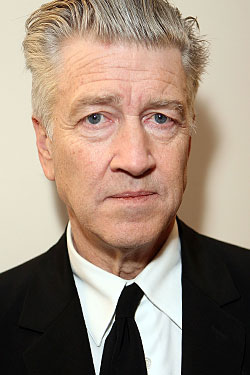
Between daily weather reports and tweeting about rainbow trout, legendary filmmaker David Lynch also makes time to introduce every episode of the fascinating web documentary series Interview Project, created by his 27-year-old son, Austin Lynch. During his downtime, Lynch is working to bring meditation into schools worldwide. Vulture caught up with Lynch at the Russian Tea Room on Sunday, before his scheduled speaking engagement with the Hudson Union Society, to discuss his favorite directors, the importance of final cut, and how his next film project will take him to India.
How did the Interview Project come to fruition?
My son Austin and his friend Jason had this idea to go on a road trip and interview people. They went on a 20,000-mile road trip, found people along the way, and started interviewing every place they went. Then they cut them together in a very good way ÔÇö short, but you get to know the people. It gives you a feeling of whatÔÇÖs happening in the world, kind of the America today, and you meet some interesting characters. ItÔÇÖs their project.
You run a foundation that strives to teach Transcendental Meditation to children. Has seeing the results of that work affected you creatively?
Not so much creatively, but it started because I saw some students who were in a school where everyone was meditating. I saw these students give a high-school play performance in a little theater on a very cold night. I thought I was going to be bored to death. Out on the stage came these students ÔÇö they werenÔÇÖt actors, they were just students ÔÇö but the play they put on was so creative, their timing so perfect, the intelligence of this play, the naturalness of their acting; I couldnÔÇÖt really believe what I was seeing. You hear the state of the schools, and theyÔÇÖve fallen to this point where itÔÇÖs beyond absurdity. Things happen in schools that no one would ever dream of ÔÇö a nightmare ÔÇö so much stress, so little learning. ItÔÇÖs very, very bad; however, you give students this technique to dive within, to transcend, to experience that big ocean of bliss ÔÇö consciousness, intelligence, creativity ÔÇö itÔÇÖs unbounded there. Give them that experience and things transform right away; this [meditation] from within changes everything.
I went on IMDb.com to see what you were up to next 
Most of it is lies 
Well, it listed Snootworld as your next directing project. Is that true?
No. [Laughs] Snootworld is a kind of childrenÔÇÖs film, and itÔÇÖs not happening yet.
What is your next project?
IÔÇÖm going to make a film on Maharishi Mahesh Yogi. It wonÔÇÖt be a so-called David Lynch film, really; it will be about Maharishi and the knowledge he brought out. ItÔÇÖll hold a lot of abstractions. WeÔÇÖre on our way to India in December to start the India part of it.
Will it be a narrative feature?
ItÔÇÖll have to go in the documentary department, I think. I donÔÇÖt think itÔÇÖll be a talking heads kind of thing, but weÔÇÖre going to do a lot of interviews with people. WeÔÇÖll interview ÔÇö I hope ÔÇö in India, a 97-year-old man who was with Maharishi from the beginning and get stories of times that werenÔÇÖt so well recorded.
YouÔÇÖre on Twitter now and seem to really interact with people.
Yeah. I started telling people what I would do this weekend and asked them to tell me what they did ÔÇö what theyÔÇÖre going to build or work on. It gives you the feeling that weÔÇÖre all out working away and we can share what we work on. That, I think, is a good thing.
What advice would you share with aspiring filmmakers who have boldly original ideas that donÔÇÖt fit into the traditional Hollywood system?
Find a way to make the film. Find a way to make the film! If you found the way was through the studio system, make sure that you have final cut, because if you donÔÇÖt have final cut it will never be your film. Stay true to your own voice; stay true to the ideas all along the way, and youÔÇÖll be okay.
Speaking of directors, who are you fond of?
I like, um ÔÇö kind of more like a comrade. I love Werner Herzog. I like Marty Scorsese. I like some Paul Thomas Anderson, Aki Kaurism├ñki ÔǪ and I know I like a bunch more.

